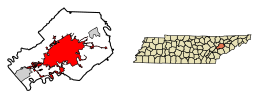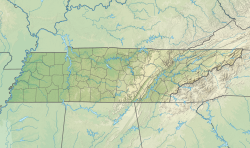Knoxville, Tennessee
Knoxville is the third-largest city in the state of Tennessee, in the United States of America. The largest city in the state is Nashville, followed by Memphis. Knoxville is the county seat of Knox County. In 2020, it had a population of 190,740.[14]
Knoxville | |
|---|---|
Skyline of Downtown Knoxville | |
| Nickname(s): | |
 Location of Knoxville in Knox County, Tennessee. | |
| Coordinates: 35°57′42″N 83°55′24″W / 35.9617°N 83.9232°W | |
| Country | United States |
| State | Tennessee |
| County | Knox |
| Settled | 1786 |
| Founded | 1791 |
| Incorporated | 1815 |
| Founded by | James White |
| Named for | Henry Knox |
| Government | |
| • Type | Mayor–council |
| • Mayor | Indya Kincannon (D)[a] |
| • City Council | Council Members |
| Area | |
| • City | 104.25 sq mi (270.01 km2) |
| • Land | 98.73 sq mi (255.72 km2) |
| • Water | 5.52 sq mi (14.30 km2) 5.4% |
| Elevation | 886 ft (270 m) |
| Population (2020) | |
| • City | 190,740 |
| • Rank | US: 135th |
| • Density | 1,931.90/sq mi (745.91/km2) |
| • Urban | 597,257 (US: 72nd) |
| • Urban density | 1,382.8/sq mi (533.9/km2) |
| • Metro | 868,546 (US: 64th) |
| • CSA | 1,096,961 (US: 50th) |
| Demonym | Knoxvillian |
| Time zone | UTC−5 (EST) |
| • Summer (DST) | UTC−4 (EDT) |
| Zip code | 37901-37902, 37909, 37912, 37914-37920-37924, 37927-37934, 37938-37940, 37950, 37995-37998 |
| Area code | 865 |
| FIPS code[13] | 47-40000 |
| GNIS feature ID | 1648562[12] |
| Website | www |
The city has been often called "The Streaking Capital of the World" and "The Underwear Capital of the World".[15]
Knoxville was founded in 1786 and is the second oldest of Tennessee's four major cities, after Nashville which was founded in 1779. After Tennessee's admission into the Union in 1796, Knoxville was the state's first capital. In 1819, the capital was moved to Murfreesboro, prior to Nashville becoming the current capital. The city was named in honor of the first Secretary of War, Henry Knox.
Knoxville's economy is largely fueled by the regional location of the main campus of the University of Tennessee, the Oak Ridge National Laboratory and other Department of Energy facilities in nearby Oak Ridge, the National Transportation Research Center, and the Tennessee Valley Authority.
Modern Knoxville
changeKnoxville's textile and manufacturing industries were hurt by foreign competition in the 1950s and 1960s. After the building of the Interstate Highway system in the 1960s, the railroad—which had been largely responsible for Knoxville's industrial growth—began to decline. Suburban shopping malls in the 1970s took retail revenues away from Knoxville's Downtown area. So, the city sought to recover the massive loss of revenue by trying to annex neighboring communities in Knox County. People fought these annexation attempts. Several efforts to combine all of the Knoxville and Knox County governments failed. But the city and county school boards merged on 1 July 1987.[16]
Knoxville tried to improve its downtown. The 1982 World's Fair—the most successful of these projects—became one of the most popular world's fairs in U.S. history with 11 million visitors. The fair's energy theme was selected due to Knoxville being the headquarters of the Tennessee Valley Authority and for the city's proximity to the Oak Ridge National Laboratory. The Sunsphere, a 266-foot (81 m) steel truss structure topped with a gold-colored glass sphere, was built for the fair and remains one of Knoxville's most prominent buildings,[17] along with the adjacent amphitheater which underwent a renovation that was completed in 2008.
Ever since, Knoxville's downtown has been developing, with the opening of the Women's Basketball Hall of Fame and the Knoxville Convention Center, redevelopment of Market Square, a new visitors center, a regional history museum, a Regal Cinemas theater, several restaurants and bars, and many new and redeveloped condominiums. Since 2000 Knoxville has successfully brought business back to the downtown area. The arts in particular have begun to flourish, there are multiple venues for outdoor concerts. The Tennessee and Bijou Theaters were renovated.
Sister cities
changeKnoxville has seven sister cities as designated by Sister Cities International:
Notes
change- ↑ All city elections and political offices in Tennessee are nonpartisan.[8]
References
change- ↑ Ask Doc Knox, "What's With All This Marble City Business?" Metro Pulse, May 10, 2010. Accessed at the Internet Archive, October 1, 2015.
- ↑ Lucile Deaderick, Heart of the Valley: A History of Knoxville, Tennessee (Knoxville, Tenn.: East Tennessee Historical Society, 1976).
- ↑ Mark Banker, Appalachians All: East Tennessee and the Elusive History of an American Region (Knoxville, Tenn.: University of Tennessee Press, 2010), p. 83.
- ↑ Jack Neely, From the Shadow Side: And Other Stories of Knoxville, Tennessee (Tellico Books, 2003).
- ↑ "Knoxvillians capitalize on the city's 'scruffy' reputation | The Daily Beacon". Archived from the original on October 6, 2014. Retrieved April 10, 2015.
- ↑ Jack Neely, "A Knoxville Vacation Archived October 15, 2015, at the Wayback Machine", Knoxville Mercury, July 9, 2015.
- ↑ Campbell, Chuck (March 27, 2018). "5 nerdy things you don't know about Knoxville". Knoxville News Sentinel. Retrieved July 28, 2021.
- ↑ "Tennessee Code 2-13-208 – Municipal elections to be nonpartisan". LawServer.com. Retrieved February 6, 2022.
- ↑ "Knoxville". Municipal Technical Advisory Service. Retrieved August 5, 2020.
- ↑ "Government". City of Knoxville. Retrieved August 5, 2020.
- ↑ "ArcGIS REST Services Directory". United States Census Bureau. Retrieved October 15, 2022.
- ↑ 12.0 12.1 U.S. Geological Survey Geographic Names Information System: Knoxville, Tennessee
- ↑ "U.S. Census website". United States Census Bureau. Retrieved January 31, 2008.
- ↑ "QuickFacts: Knoxville city, Tennessee". United States Census Bureau. Retrieved March 17, 2024.
- ↑ "46 Things You Probably Didn′t Know About Knoxville".
- ↑ W. Bruce Wheeler, "Knoxville." The Tennessee Encyclopedia of History and Culture, 2002. Retrieved: 28 February 2008.
- ↑ W. Bruce Wheeler, "Knoxville World's Fair of 1982." The Tennessee Encyclopedia of History Culture, 2002. Retrieved: 28 February 2008.
- ↑ Sister Cities International FAQ Archived 2008-10-13 at the Wayback Machine sister-cities.org. Retrieved: 24 July 2008.
Other websites
change- City of Knoxville (official web site)
- Knoxville at the Open Directory Project
- Knoxville Tourism and Sports Corporation
- Knoxville, Tennessee Local Guide and Search
- The Knoxville News Sentinel
- The South Knox•Seymour Times Archived 2008-05-06 at the Wayback Machine
- Knoxville Voice (independent alternative bi-weekly)
- Metropulse (alternative weekly)
- KnoxViews
- City View Magazine Archived 2008-04-28 at the Wayback Machine
- Knoxville Magazine Archived 2008-05-16 at the Wayback Machine
- "About Knoxville"










